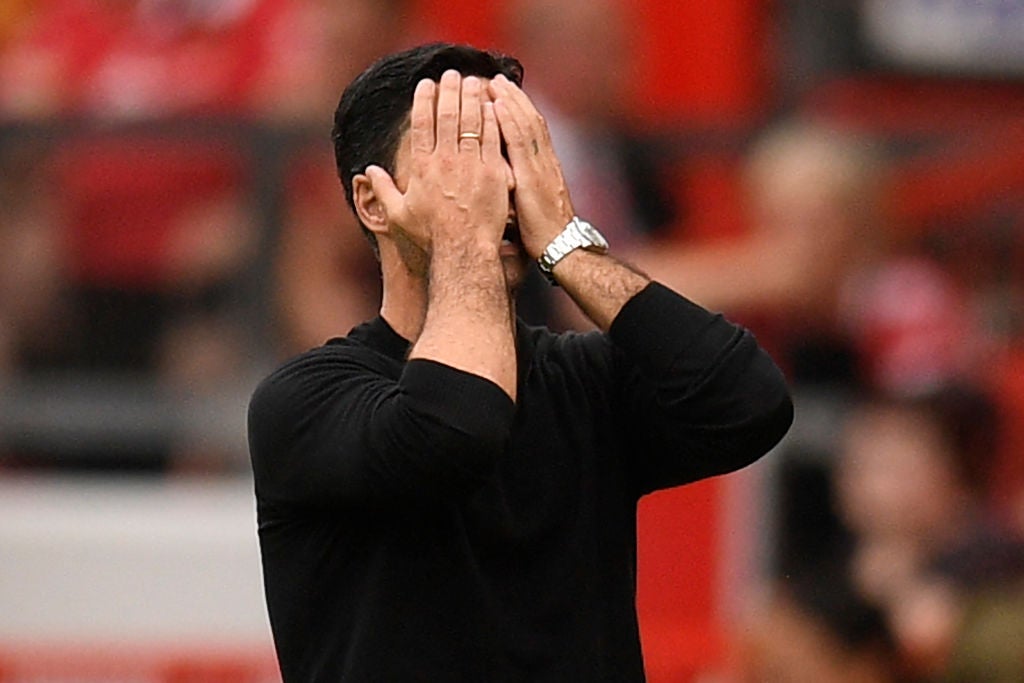
Arsenal are better. Arsenal are ready. Arsenal are back. From where and what they’re ready for is still up for debate, but the excited masses of supporters have been – entirely understandably – near-giddy at the Gunners sitting top of the early Premier League table.
Unquestionably, there is greater cohesion in parts of the team at the start of this season, better depth in key areas and individual improvement on show in the squad.
On the sidelines, Mikel Arteta continues to cut an invested, demanding figure. He deserves credit for Arsenal being a more watchable, enjoyable (oh, and a more frequently winning) team for sure, even if there remains more than a tinge of over-animation about his technical area dramatics. More than a few have expressed the opinion of it being faintly comedic watching the Spaniard in action: furiously gesticulating and stretching to bellow orders at a player three yards away from him on a throw-in, or burying his face in his hands after the concession of a goal.
But therein also lies a part of the puzzle to solve which now confronts the Gunners: to truly transition into a side which can compete at the top again, they must be able to handle setbacks far better than the evidence until this point suggests.
Head-in-hands Arteta is only a metaphor for this, of course. In body language terms, the Old Trafford counterattack sucker-punch defeat will already be out of the system – but the mind also plays a funny role in this sport.
Arsenal, too often, have allowed one defeat to spiral, with another following soon after and dropped points being racked up quickly in quite in the same way Martin Odegaard racked up final-third passes in the opening five games of the season.
The thing is, in that first quintet – all victories – the north London side did not actually play anybody certain to finish in the top half this term. Crystal Palace certainly might, but the rest – Leicester, Bournemouth, Fulham, Aston Villa – are not screaming early-season definites to do so. It means the first real test they faced, the first opponent to play them who held serious ambitions of their own, beat them.
Analysis and reasoning for the defeat played a significant part in the aftermath, as is usual when the biggest butt heads. Arsenal played well and dominated possession, but didn’t win. It happens. It certainly does, but in this case, that’s the entire point: up until now under Arteta and before him with Unai Emery, the team had been easily identifiable by runs of wins over the league’s fodder, and failures to win against better outfits... and those which follow.
Overblown boom and all-too-predictable bust has for too long been the status quo at the Emirates.
Roll it back to the start of 2019-20 and the unravelling of Unai. Just one defeat in eight was a reasonable start, albeit with too many draws, but that was followed by one win in 12.
Arteta, either side of the Covid interruption, got matters back on track with eight unbeaten beforehand and only two losses in eight to finish up with. But he also managed a run of seven defeats in 10 at the start of 2020-21 and another run of nine non-wins in 13 mid-season.

Five straight wins to end the campaign gave confidence but starting 21-22 with three straight defeats quickly eroded it. On and on it goes: they have beaten the likes of Wolves, Brentford, Watford and Leicester in a row, but a difficult defeat to Liverpool sends them spiralling to further subsequent losses to Palace, Brighton and Southampton.
It is a process to improve in team building and one which cannot be forced or rushed (at least if hundreds of millions are not available to spend), but it’s also a significant psychological barrier to overcome as a team when it comes to winning those most crucial of encounters... and bouncing back quickly when you don’t.
Last week, United won. Whether Arsenal played well or not ultimately doesn’t matter in the immediate aftermath: Erik ten Hag’s tactics were employed better, or more clinically, than Arteta’s were. Perhaps not in a sustainable fashion, but that’s beside the point – you have to win the game which is played, not theoretically win more occasions if the same fixture was played 10 times over.
Since that hurdle was not crossed, the next one must be, and much-changed line-ups in the timid, glamourless Europa League do not count in the search for consistency.
Brentford, Tottenham and Liverpool lie in wait, each with their own big reasons for needing points and their own mental barriers to jump, but Arsenal – if they truly want to show they are ready to mix it near the top once more – cannot let that, or anything else, get in the way of an immediate return to form this time.







